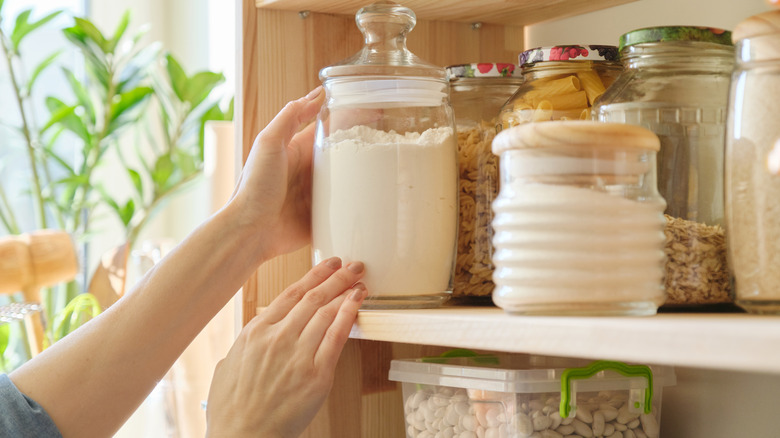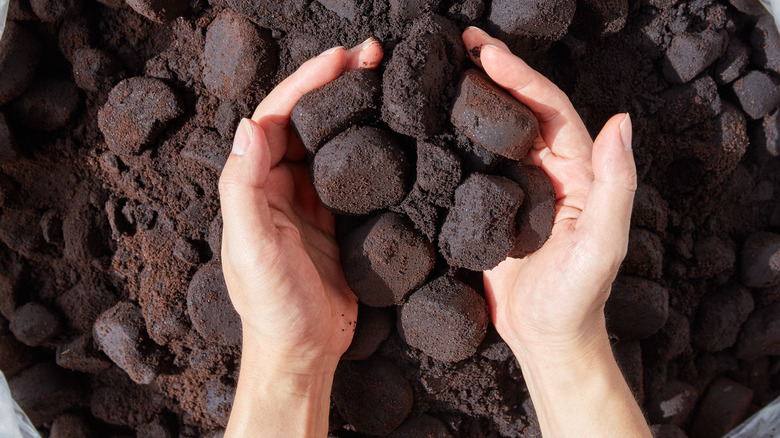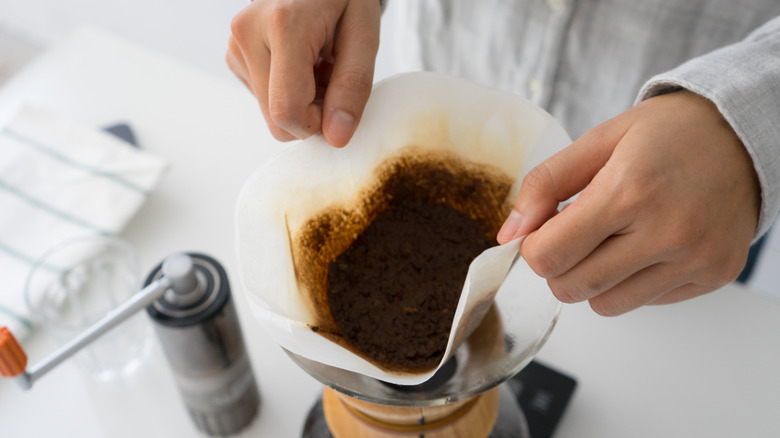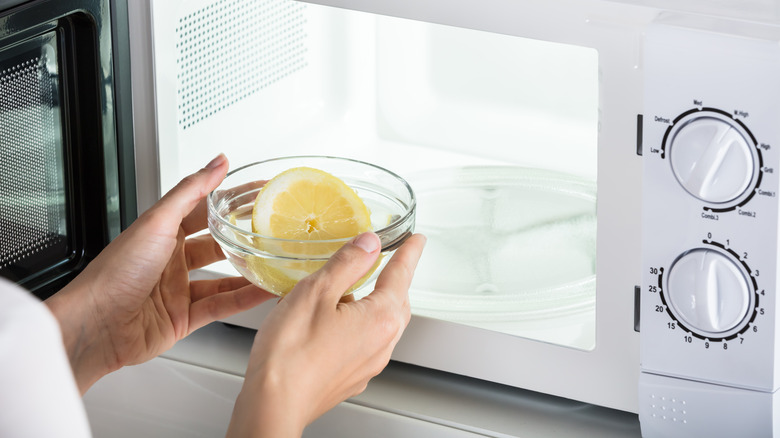Genius Tips And Tricks To Deodorize Your Smelly Kitchen
We may receive a commission on purchases made from links.
Everyone wants a clean, perpetually fresh-smelling kitchen, but it's common for stubborn food odors to hang around. To eradicate unsavory smells, you need to get to the root cause and target it effectively. Whether you're battling the lingering hints of last week's dinner in your garbage can or the old aroma of popcorn that refuses to leave your microwave — these odors can make your kitchen feel less clean and welcoming — and you need actionable and smart strategies that involve more than opening a window or taking out the trash.
It's also important to know why these odor-removal techniques work, so you can use methods that are rooted in simple chemistry rather than urban legend. Understanding how certain formulas combat odor will help you keep your kitchen smelling fresh around the clock and change how you fight unwanted aromas. Of course, even the best deodorizing hacks can't replace a solid kitchen cleaning routine, so be sure to prioritize promptly dealing with spills, splatters, or spoiled food. Read on for a list of clever and actionable kitchen deodorizing tips.
Put a jar or dish of baking soda in your cabinets to deodorize them
Want to know why you should leave a jar of baking soda inside your smelly kitchen cabinets? Sodium bicarbonate is famous for fighting odors and neutralizing them, and it may help absorb small amounts of lingering moisture in your cupboards. Besides these advantages, baking soda is a non-toxic, natural substance that's safe to have around your food items or plates and cups. Also, baking soda is easy to get and inexpensive, making it an ideal fix for removing unpleasant odors from your kitchen without using chemicals.
Start by filling an open container or baking dish roughly halfway with baking soda. You want something with a wide mouth to increase how much sodium bicarbonate gets exposed to the air so it can absorb as many odor particles as possible. Empty your cupboards and put the container in the back of your cabinets, where you won't knock it over. Leave it in the empty cupboard overnight or until the aroma has dissipated, remove the baking soda, and replace your dishes. Before you implement this tip, your cabinets should be relatively dry. While baking soda might be able to pull small amounts of moisture from the air, it won't be a match for serious damp issues. Too much moisture can make baking soda clump, which may impact its odor-fighting abilities. If you struggle with damp cabinets, you may want to try something like these Bagus moisture absorber boxes from Amazon.
Make a vodka-based spray with essential oils
Mixing essential oils with cheap vodka to make a spray can also help fight kitchen odors. Vodka and other spirits aren't a replacement for antibacterial cleaning products, but they can be used in mild DIY cleaning solutions and deodorizers. To cover the alcohol's smell, you can mix your favorite essential oils with it to create a scented spray. Lavender, mint, or lemon all have nice aromas, as well as antimicrobial properties. As a bonus, alcohol evaporates faster than water, ensuring you won't have a lot of moisture buildup that could cause mold or mildew to grow.
To make this DIY deodorizer, mix equal parts water and vodka in a spray bottle before adding a few drops of your chosen essential oil. Shake well and spray your countertops, inside the garbage, or any fabric items like dish towels or curtains that can trap food smells. After spraying, wait a few minutes for the alcohol content to evaporate. Then, use a clean cloth to wipe away any lingering spray from your hard surfaces. While this works for light cleaning or deodorizing, it won't be heavy-duty enough for serious sanitization jobs or hard-to-budge grime, grease buildup, and stains. Also, if pets come into the kitchen, check that whatever oils you use are safe because some can be toxic to animals. Finally, alcohol can damage certain wood finishes, so use on furniture with care.
Use tea bags as odor absorbers in the refrigerator
Got a gross smell going on in the fridge? You may be surprised to hear that tea bags are the secret weapon your smelly refrigerator needs. Green and black tea contain tannins that can help naturally neutralize odors. The theory is that the leaves will absorb unpleasant smells that build up in your refrigerator from pungent foods or spoiled leftovers. The tea will also leave a subtle, pleasant scent that lingers without being overwhelming. Tea bags in the fridge might sound crazy, and science has yet to conduct a study on this topic — but anecdotal evidence supports the theory that tea leaves can help target unwanted fridge smells.
If you want to implement this hack, put a plate or bowl of dry, new tea bags in the fridge. Both black and green tea contain tannins, but black tea has the most and green the fewest, so you may see different results based on your choice. The bag count will depend on the size of your fridge and how strong the odor is. Try to place the bowl or plate of tea bags as close to the smell as possible. If the whole refrigerator smells, spread them out with some in the back, in bins or drawers, on the shelves, and in the doors. You can also use loose leaf tea, but whichever type you pick, you'll want to swap it out every few days for maximum results.
Sprinkle baking soda and place cotton balls with essential oils into trash cans to deodorize them
Baking soda is a popular odor-removing solution since it can help neutralize both basic and acidic odor molecules through a chemical reaction that combats smell particles instead of covering them up. If you want a clean scent as well as odor removal, incorporating a clever use for cotton balls by soaking some in essential oils should do the trick. If you use the right oils, they can also help kill bacteria, assisting to keep icky odors at bay, and combined with baking soda will probably get you a cleaner scent overall.
Once you remove the trash bag and clean and dry your garbage can, sprinkle a layer of baking soda into the bottom to create an odor-absorbing barrier. For the essential oils, place a few drops of your chosen oil on some cotton swaps and put them in your trash can underneath the bag. Replace the cotton balls whenever you take out the trash. If your trash is food-heavy or wet, add more baking soda and clean it once a week to fight odors. Weekly or biweekly cleanings can also prevent the baking soda from forming clumps.
Use activated charcoal to neutralize cooking odors
Activated charcoal is another substance you can use to reduce old cooking smells in your kitchen. This compound is very porous, so it can easily absorb odor-causing particles. A mere gram of activated charcoal offers a surface area of 500 square meters, allowing it to lock in more smells. Unlike some tricks that simply hide odors, this one removes them to make your air smell better, rendering it ideal for kitchens where you might have several sources of odors. Activated charcoal is also a non-toxic, natural solution that is safe to use in food prep areas.
One way to harness the power of activated charcoal is to buy pouches or filters containing charcoal designed to purify the air, such as these odor-absorbing bags from Amazon. You can also get charcoal reeds or ornamentally carved sticks. Even plain briquettes can work in a pinch. Place the bags, sticks, powder, or briquettes around your kitchen, especially where you have problems with odors, like by the trash or stove. You might want to swap in a fresh batch every month or so for best results, as the activated charcoal's ability to absorb odors may drop over time. If your kitchen is humid, you might need to swap out the charcoal more often because moisture could decrease its aroma-absorbing abilities. Some brands of aroma-busting charcoal bags also recommend refreshing the satchels by placing them in the sun to dry out.
Put vanilla extract in the oven for a sweet, comforting smell
Did you know a clever vanilla hack will banish odors for a full day? Putting vanilla extract into the oven will infuse your entire kitchen with a comforting, sweet smell. Vanilla contains a compound called vanillin that has a pleasant but strong scent that can mask odors. When you heat the vanilla extract, it will evaporate and spread fragrance throughout the room. This trick works well after you cook foods with more pungent odors or if you accidentally burn something, refreshing the air and helping to create an inviting, warm atmosphere.
Set your oven to 300 degrees Fahrenheit, and put two teaspoons of vanilla extract in a bowl that can go in the oven. Leave it there for an hour, keeping an eye on the vanilla in the oven to ensure it doesn't burn. Short on time? Put ½ cup of water and a teaspoon or two of vanilla extract in a microwave-safe bowl. Heat it on high for one minute. You can adjust the heating time or vanilla amount, depending on how strong you want the scent. Using real vanilla extract instead of imitation can yield a richer fragrance.
Set out coffee grounds overnight to absorb odors
You can also reuse coffee grounds to eliminate bad home odors. Coffee is rich in nitrogen, which can help target stinky, sulfurous smells in the air, grabbing onto odor-causing molecules, such as lingering cooking smells of garlic or fish. Also, coffee grounds have a pleasant, strong scent that can overwhelm unwanted aromas while bringing in a warm, comforting smell. It's a natural, safe, and eco-friendly option that uses something most people have on hand. This makes it very accessible and removes the need for chemical sprays or artificial scents.
Put some grounds in a small bowl and set it in your kitchen where children or pets can't get to it, or you might accidentally knock it over and make a mess. You can also put grounds in small mesh bags and hang them around the kitchen area, replacing them every few months. Be aware that while this can work for tempering general kitchen odors, it may not be strong enough to eliminate every smell, especially if you don't remove the odor's source. Also, it leaves a coffee scent, so if you're not a fan, you'll want to sit this one out.
Remove fried food or fishy smells with vinegar and cinnamon
Getting rid of strong, fishy or fried food smells is easy with two common ingredients, vinegar and cinnamon. Vinegar works as a natural deodorizer that breaks down odor-causing molecules to neutralize them. It contains acetic acid that can knock out strong smells, including those that linger around the kitchen. Cinnamon has a warm, pleasant aroma, as well as antimicrobial properties that can help kill odor-causing bacteria. When mixed and heated, the vinegar will evaporate and carry the cinnamon smell throughout your home to mask stinky odors. It gives you a non-toxic alternative to commercial-grade air fresheners and is easily accessible.
To use this tip, bring five or six tablespoons of vinegar, a few cups of water, and some cinnamon sticks to a boil in a medium saucepan. Once the mix boils, reduce the heat so it simmers. The vinegar will start neutralizing odors while the cinnamon gives off a comforting scent. Let it simmer for 15 to 20 minutes, or even a few hours, watching the pot so it doesn't boil dry. After turning it off, leave the saucepan on the stove to cool and let the scent linger around the kitchen area. If you have respiratory issues, be careful with this because the strong vapors can irritate one's airways.
Steam clean the microwave with lemon water
One of the easiest ways to clean a microwave is by steaming the interior with lemon water. The steam from the lemon water softens dried grime and food particles, making them easier to wipe off. Lemon contains citric acid, which can function as a cleaning agent to deodorize and cut through greasy residue. When heated, the lemon juice will release a clean, fresh scent that neutralizes bad odors and leaves a pleasant citrus smell behind. It works very well after you warm up strong-smelling foods in the microwave or if you've skipped cleaning the interior for a while. It'll take care of the odors and their causes — while helping you get a spotless clean.
Firmly roll your lemon on the counter to soften the inside and make it easier to get the juice out before cutting it in half. Squeeze the juice into a bowl, drop the spent lemon halves in, and pop the bowl into the microwave. Run it on high for 5–10 minutes. The water should boil, and the steam will condense on the microwave's ceiling and walls. When the time is up, leave the door closed for a few more minutes to let the steam work, put on oven mitts, and carefully remove the hot bowl. Wipe down your microwave's interior with a soft sponge or cloth, ensuring you hit the inside of the door and the rubber gasket.









